John Marston is best remembered as the manufacturer of Sunbeam bicycles,
cars and motorbikes. Further details of these, as well as of his
life, can be found in the
Transport Hall of this Museum. But his first efforts were in
domestic wares.John was born in 1836. According to Robert Cordon Champ, in
1851 John and his father Richard "signed indentures with Edward Perry of
Richard Perry, Son & Co., tinsmiths and japanners of Wolverhampton"; and
that their Jeddo works, which were founded in 1790, were on the south
side of Jeddo Street, next to the site that would later become
Sunbeamland. But according to W. H Jones, Edward Perry had, at the
time, a separate firm from that of Richard Perry, with works in Paul
Street. Richard Perry was in Great Brickkiln Street but seems
later to have moved to Temple Street.
When his apprenticeship was over John Marston purchased Daniel Smith
Lester's japanning business at Bilston in 1859. John was just 23 years
old. Nothing seems to be known about this business but, whilst
Wolverhampton japanners generally worked on papier mache, Bilston
japanners generally worked on tin plate. Richard Perry, and
probably Edward Perry, also worked in tin plate. So John Marston's
background would have included metalworking as well as metal finishing.
Edward Perry had no children to carry on the business after his death
in 1871. Jones says: "His trade, after his death, was
transferred to his nephews, Messrs. Lees, who at that period were
carrying on the business of Richard Perry & Sons, in Temple Street.
At the present time [sc.1899] the same concern is being carried on by
William Lees, under the title Richard Perry, Sons and Co.". The
Jeddo works themselves were sold to John Marston. What seems
to have happened is that Richard Perry took over the business of Edward
Perry but sold the buildings (though whether with or without the
machinery and materials is not known) to John Marston. Presumably
Marston sold the Lester works in Bilston and moved his entire operation
to the Jeddo works.
In 1877 John Marston's works were extended into Paul Street. The product
range included bread dishes, dish covers, pots, pans, kettles, spirit
lamps, foot warmers and black enamel ware. The company became one of the
two largest makers of black enamelled ware in the country.
In 1883 Frederick Walton's Old Hall japanning works were demolished.
His firm must have closed sometime before but why and when is not known.
At the time the japanning business, particularly the fancier side of it,
was in the doldrums. Frederick Walton may have died or decided to
retire. But the goodwill of his business, though not, of course,
the premises, seems to have been bought out by John Marston.
 |
The evidence for this acquisition comes from this
hot water plate. The plate is owned by Vin Callcut, to
whom we are obliged for these photos. |
| This mark appears on the bottom of the plate.
(The base of the plate was originally nickel plated on copper).
Frederick Walton had taken over this father's japanning business
but seems to have expanded the range into general metalware, as
W. H. Jones says that the "firm took the front rank in making dish
covers, patent coffee pots, etc.". |
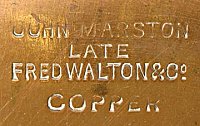 |
At some point John Marston also moved into brass and
copperware. Such items have recently been positively identified as
being made by Marston: Andrew Everett has been able to link a
number of marks which connect the "JM" mark with Paul Street.
Whether John Marston took up manufacturing in these metals upon taking over
Walton's, or whether this was an independent development, is not known,
but the latter seems more likely.
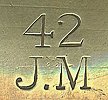 |
John Marston's mark on brass and copperware was the
letters "J.M" shown here. (The number 42, above the
letters, is probably a pattern number). Other (and
probably earlier) items by Marston have been found with more
elaborate marks. |
| Water cans by John Marston, in two sizes. It may
be significant that, although most manufacturers produced water
cans in this style, there are points of difference in the
details. But these cans appear to be identical in all
respects to cans bearing the Perry mark. |
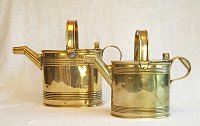 |
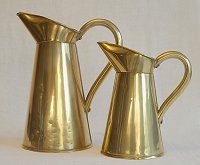 |
Water jugs, or ewers, by John Marston in brass, in two
sizes. |
| A lidded jug by Marston. Marston's water jugs can
seem a little squat compared with some others, such as those by Sankey.
But this lidded version looks very elegant. |
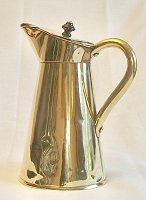 |
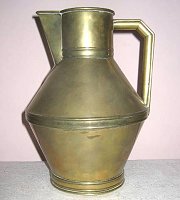 |
A jug by John Marston in brass.
Photo by courtesy of Andrew Everett. |
| Kettle, in brass and copper, by John Marston. Photo by courtesy of Andrew Everett. |
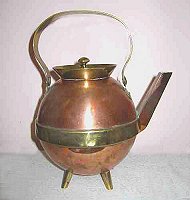
|
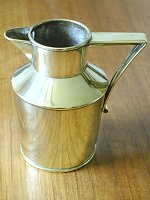 |
A brass jug by John Marston. Photo by courtesy of Elaine Barclay. |
The jugs and the kettle shown above are important evidence in the
question of the extent of Christopher Dresser's design work in
Wolverhampton. This general issue will be dealt elsewhere in this
Museum in due course; but suffice it to say here that the close
connection between John Marston and Richard Perry Son & Co. - known
users of Dresser's services - should be noted.
But John Marston had started making bicycles, with great success, and was
making a start on cars. He decided to concentrate his business in
these areas. Marstons owned Orme Evans Limited, where the domestic
brassware was presumably made and labelled 'JM'. In 1902 John Marston sold the japanning and metalware side of
the business, which was then run by Orme Evans, who were large producers
of domestic enamel wares.
|
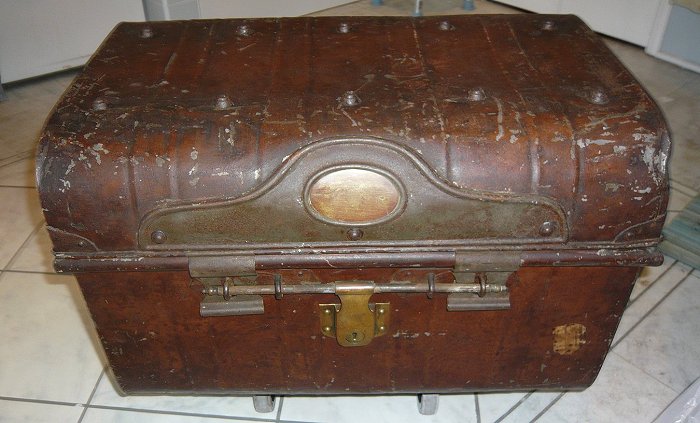
An early, extremely heavy duty tinned steel trunk, by John
Marston. Courtesy of Robert Cordon Champ. |
|
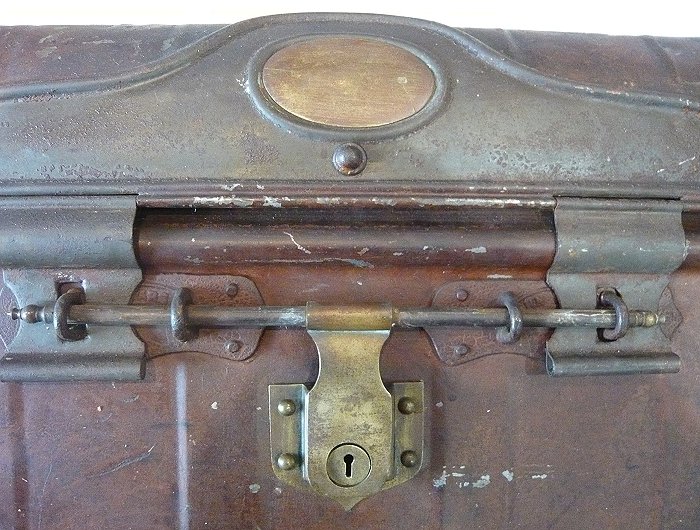
A close up view of the locking mechanism on the trunk.
Courtesy of Robert Cordon Champ. |
|
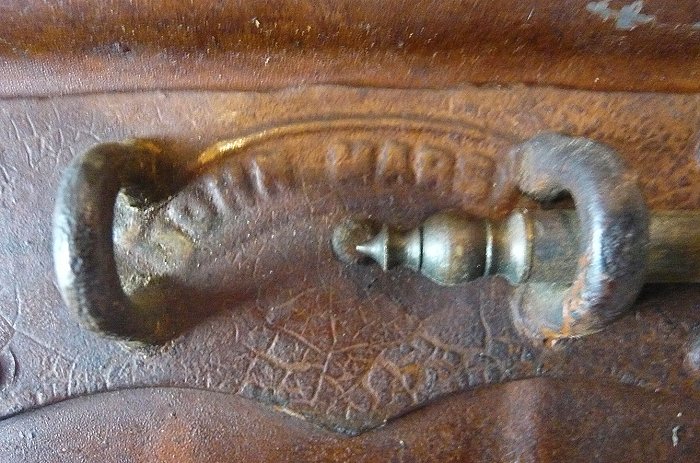
Part of the locking mechanism that carries the John Marston
name. Courtesy of Robert Cordon Champ. |
|
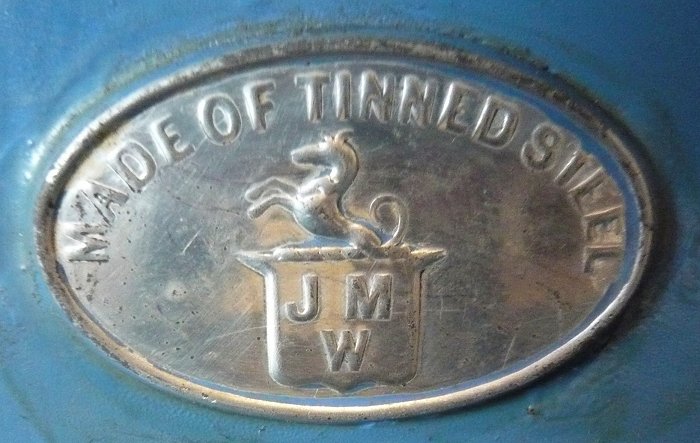
The plate inside the trunk, labelled J M. Courtesy of
Robert Cordon Champ. |
|

